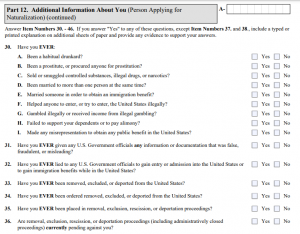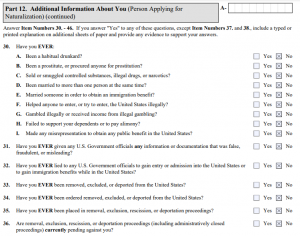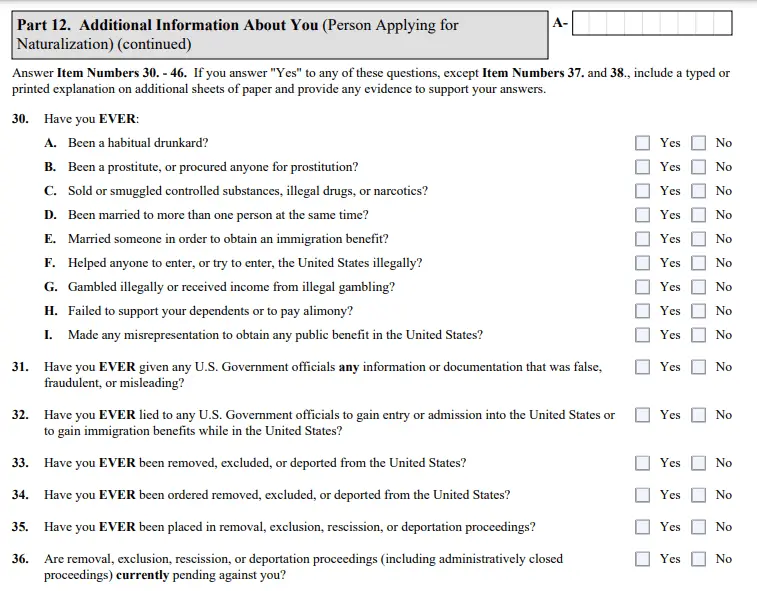Demystifying Part 12 of the N-400 Form: Additional Information About You (Person Applying for Naturalization) (5)
Introduction
The path to U.S. citizenship is a significant and life-changing journey for many immigrants. Part of this journey involves completing the N-400 form, the Application for Naturalization. This essential document plays a pivotal role in the naturalization process, requiring applicants to provide a comprehensive set of information about themselves. One crucial section of the N-400 form is Part 12, which focuses on “(Additional Information About You (Person Applying for Naturalization)).”
Understanding Part 12 of the N-400 Form
Navigating the N-400 form can be a complex and daunting task for applicants seeking U.S. citizenship. Part 12 is located on page 15 of the form and holds paramount importance in the application process. It consists of several questions (numbered 30 to 36) that delve into specific aspects of an applicant’s background and history. Responding to these questions accurately and honestly is a fundamental requirement, as they help immigration authorities assess an applicant’s eligibility for naturalization.
Questions in Part 12 of the N-400 Form
The N-400 Form – A Deep Dive into Part 12
Part 12 of the N-400 form consists of a series of questions, each designed to gather specific information about the applicant’s background and history. These questions aim to ensure that individuals seeking naturalization meet the requirements and standards set by U.S. immigration authorities.

Question 30: Moral and Legal Standing
Question 30 addresses various aspects of moral and legal standing. It includes inquiries about whether the applicant has ever been a habitual drunkard, engaged in prostitution, sold or smuggled controlled substances or illegal drugs, committed bigamy, entered into a fraudulent marriage for immigration benefits, helped others enter the U.S. illegally, participated in illegal gambling, failed to support dependents or pay alimony, or made misrepresentations to obtain public benefits in the United States.
Why It Matters: This question aims to assess an applicant’s moral character and adherence to U.S. laws. Answering “Yes” to any of these sub-questions requires providing a detailed explanation on additional sheets of paper and supporting evidence.
Question 31: False Information
Question 31 inquires about whether the applicant has ever provided U.S. government officials with false, fraudulent, or misleading information or documentation.
Why It Matters: This question evaluates the applicant’s credibility and truthfulness in dealings with U.S. government authorities. Providing false information can have serious consequences for the naturalization process.
Question 32: Lying to Gain Entry or Benefits
Question 32 focuses on whether the applicant has ever lied to U.S. government officials to gain entry into the United States or to obtain immigration benefits while within the country.
Why It Matters: Truthfulness is paramount in immigration processes, and this question helps determine if the applicant has been forthcoming and honest in their dealings with U.S. authorities.
Question 33, 34, and 35: Immigration History
Questions 33, 34, and 35 are interconnected and deal with an applicant’s immigration history. They inquire about removal, exclusion, deportation, and placement in related proceedings.
Why It Matters: These questions aim to establish an applicant’s immigration history and whether they have been subject to removal or deportation orders or proceedings.
Question 36: Pending Proceedings
Question 36 seeks information about whether there are any current removal, exclusion, rescission, or deportation proceedings against the applicant.
Why It Matters: This question addresses the applicant’s ongoing immigration status and legal matters that may affect their eligibility for naturalization.
Sample Persona: Navigating Part 12 of the N-400 Form
Introducing the Fictitious Applicant – Mei Li
To provide a practical example of how to approach Part 12 of the N-400 form, let’s meet Mei Li, a fictitious applicant from China. Mei Li is a 34-year-old individual who has been a lawful permanent resident in the United States for the past eight years. She’s decided to pursue U.S. citizenship, and her journey begins with the N-400 application.
Answering Questions in Part 12

- Question 30 (A-G): Mei Li responds to these questions with a firm “No.” She has never been a habitual drunkard, engaged in prostitution, sold or smuggled controlled substances, committed bigamy, entered into a fraudulent marriage for immigration benefits, helped others enter the U.S. illegally, or participated in illegal gambling.
- Question 30 (H-I): Mei Li answers “No” to these questions as well. She has always met her financial obligations and has never made misrepresentations to obtain public benefits in the U.S.
- Question 31: Mei Li confidently answers “No” to this question. She has never provided false, fraudulent, or misleading information or documentation to U.S. government officials.
- Question 32: Mei Li also answers “No” to this question. She has never lied to gain entry or immigration benefits in the United States.
- Questions 33, 34, and 35: Mei Li confirms that she has never been removed, excluded, deported, or placed in related proceedings, answering “No” to all three questions.
- Question 36: Mei Li responds with a “No” as there are no pending removal, exclusion, rescission, or deportation proceedings against her.
Mei Li’s answers exemplify the importance of responding honestly and in accordance with her own circumstances. Each applicant’s responses should be based on their unique experiences and history.
Required Initial Evidence
Along with answering the questions in Part 12, applicants must be aware of the checklist of required initial evidence. This checklist helps ensure that the N-400 application is complete and accurate.
Checklist of Required Initial Evidence
Applicants should review the following checklist before completing their N-400 form:
- A copy of your Permanent Resident Card (commonly called a Green Card).
- A copy of your marriage certificate (if applicable).
- Form N-426, Request for Certification of Military or Naval Service (if you are applying for naturalization based on military service).
- DD Form 214, NGB Form 22, or discharge orders (if applying for naturalization based on military service and are separated from service).
- A copy of your official military orders (if you are applying for naturalization based on military service and are currently serving).
- Evidence of your citizen spouse’s employment abroad (if applying under INA 319(b)).
- Two passport-style photographs (if you reside outside the United States).
Please note that this checklist serves as a reference and should not be submitted with the N-400 form. All documents submitted in a foreign language should include a full English translation along with a certification from the translator verifying the translation’s completeness and accuracy.
The Significance of Honest Responses
Answering the questions in Part 12 of the N-400 form honestly and accurately is of paramount importance. The naturalization process places a strong emphasis on an applicant’s moral character, truthfulness, and adherence to U.S. laws. Immigration authorities rely on these responses to assess eligibility, and any discrepancies or untruthful answers may result in delays or even denials.
Applicants should remember that it is perfectly acceptable to answer “Yes” to certain questions in Part 12. The key is to provide comprehensive explanations on additional sheets of paper, along with any supporting evidence. Acknowledging past mistakes or missteps is a part of the naturalization process, and immigration authorities appreciate an applicant’s willingness to rectify and learn from those experiences.
Conclusion
In conclusion, Part 12 of the N-400 form plays a critical role in the naturalization process. Understanding the questions, their significance, and the importance of providing honest and accurate responses is vital for all applicants. Mei Li’s example demonstrates how a fictitious applicant navigates these questions with integrity.
As you embark on your journey towards U.S. citizenship, it’s essential to remember that the N-400 form is a significant step in the process. Honest and truthful responses not only ensure a smoother application process but also uphold the values and integrity of the U.S. immigration system.
Should you have any doubts or concerns when completing your N-400 form, seeking professional advice or legal counsel can be invaluable. Navigating the complexities of the immigration process can be challenging, and having the right guidance is often key to success.
In your pursuit of U.S. citizenship, remember that each applicant’s journey is unique, and the naturalization process is designed to be both comprehensive and inclusive. By approaching Part 12 with integrity and providing accurate information, you are taking an essential step towards achieving your goal of becoming a U.S. citizen.

